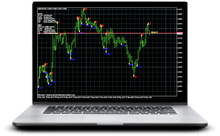Capital Gain
Capital Gain
A capital gain is a profit made from the sale of any capital asset (investment or real estate) where the sale price exceeds the purchase price of the investment (called the investment's cost basis). Capital gains can occur in assets such as property or goods, as well as mutual funds, bonds, options, collectibles and businesses. A capital gain may be short-term (one year or less) or long-term (more than one year) and must be claimed on income taxes. Long-term investments in collectibles are taxed at a flat 28%. Short-term investments in collectibles are taxed as short-term capital gains at your ordinary income tax rates.
BREAKING DOWN 'Capital Gain'
If you lost money on an investment, then you incurred a capital loss. A capital loss can reduce your taxes. If your capital losses exceed capital gains, you can deduct the loss from your income.
While capital gains are generally associated with stocks and funds due to their inherent price volatility, nearly everything you use and own is a capital asset and can be subject to tax. Anything you sell for more than the actual purchase price, resulting in capital gains, can be taxable. A capital loss is not tax deductible.
Capital gains can be either realized or unrealized. Unrealized assets are those that are appreciated in value, but have not yet been sold. The capital gain is a potential value. A realized capital gain occurs when an asset has appreciated in value and been sold.
Tax Consequences of Capital Gains and Losses
The amount of taxes that you pay on a capital gain depends on the income tax bracket you’re in, how long you have owned the asset, and the type of capital asset you’re dealing with.
For example, mutual fund investors should determine a mutual fund's unrealized accumulated capital gains, which are expressed as a percentage of its net assets, before investing in a fund with a significant unrealized capital gain component. This circumstance is referred to as a fund's capital gains exposure. When distributed by a fund, capital gains are a taxable obligation for the fund's investors.
Short-term capital gains are taxed at the same top-tier rate as your regular income. On the other hand, long-term capital gains on most items are taxed at either 0% (for 10% and 15% tax brackets), 15% (for 25% through 35% tax brackets), or 20% (for the 39.6% tax bracket) in 2015. That said, certain other items may be taxed differently – for instance, collectibles are taxed at a maximum rate of 28%.
Capital Gains Distributions by Mutual Funds
Mutual funds often sell profitable investments at certain times throughout the year. The funds then distribute the profits to shareholders in the form of a capital gain distribution. Individuals receiving a distribution get a Form 1099-DIV, which shows dividends and capital gains distributions paid throughout the year. Capital gains distributions are taxed at long-term capital gains tax rates, no matter how long you have personally owned shares in the mutual fund.
Many investors re-invest dividends and capital gains distributions received from their mutual funds. Each reinvestment is both a cash distribution and an additional fund purchase. The dividends and capital gains distributions are included taxable income. The additional shares purchased in the reinvestment have their own cost basis (the purchase price of the shares) and their own holding period.
2022-11-23 • Updated











